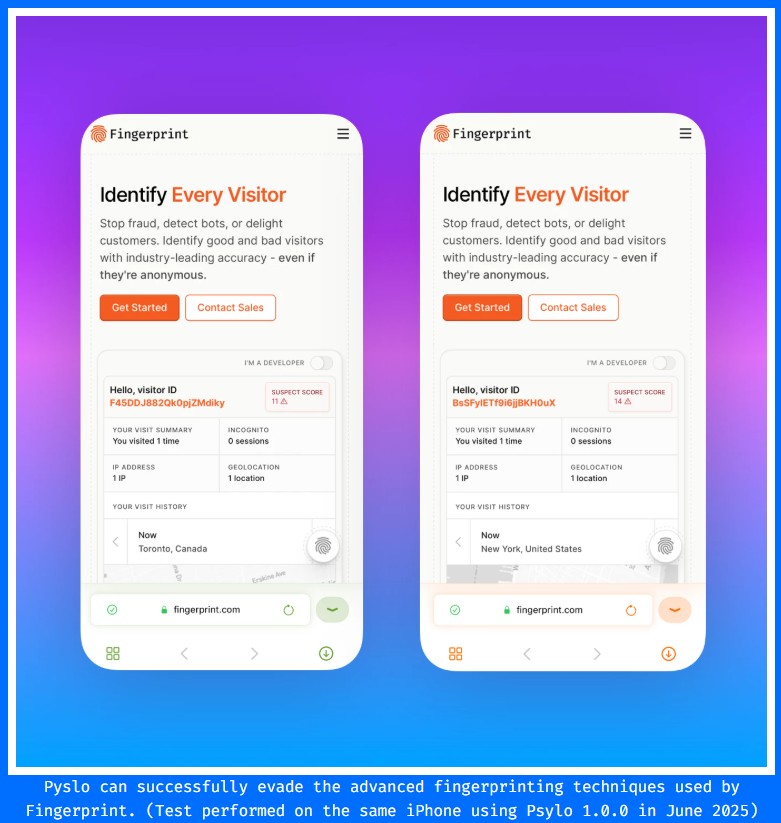VPNs cannotprotect against browser fingerprinting– but this new web browser could be the fix
- Two privacy researchers have just unveiled a one-of-a-kind private web browser
- Psylo offers anti-tracking and anti-fingerprinting features that promise to go beyond VPN protection
- Psylo is currently available on iOS and iPadOS only
Two privacy researchers have just unveiled a “new kind of private web browser” that promises to fix an issue afflicting the industry – browser fingerprinting.
Talal Haj Bakry and Tommy Mysk built Psylos with an innovative isolated tab system powered by a proxy network. This means each tab is open in its own “silo,” with isolated storage, cookies, and even its own IP address.
Psylos’ anti-tracking and anti-fingerprinting features promise to go way beyond the protection of the best VPN services, too. The app is currently available for iOS and iPadOS only.
Getting where VPNs cannot

Recent research conducted by Texas A&M University found the first hard evidence that many websites use browser fingerprinting to track people for online advertisement purposes.
Browser fingerprinting is a technique to track internet users across apps and websites. It does so by collecting details about their devices and browsers to create a unique digital fingerprint.
More users have been turning to virtual private networks (VPN) to minimize online surveillance. Yet, while a VPN can mask your real IP address, it cannot do the same for your device model, system timezone, language, and other identifiable bits of metadata. All these details, however, can still be enough to reveal the user’s identity.
Bakry and Mysk built this proof-of-concept web page to show how your real location can be revealed by details such as the system’s timezone settings, even when you are connected to a VPN
“This is one place where Psylo really shines. Not only does every silo get a unique IP address through our proxy network, but it also matches the locale and timezone of its associated proxy server,” Bakry and Mysk explain in a blog post.
How Psylo works
As mentioned earlier, Psylo works via a system made of web silos, or isolated web sessions, that runs within a no-log proxy network – the Mysk Private Proxy Network.
This means that every Psylo tab becomes completely customizable and detached from each other, making it even harder to track you across the apps and websites you visit.
For example, you can configure one tab to connect to your X account with a Canadian IP, while configuring another for Instagram, connecting via Germany. Psylo will also automatically spoof the browser’s language and timezone accordingly.
At the moment, you can choose among 40+ servers dotted across Australia, Brazil, Canada, Germany, the UK, Japan, and the US.
🚀🤘Introducing Psylo: A New Kind of Private BrowserAfter 9 months of development, we’re super excited to finally launch Psylo, a new kind of private web browser for iOS and iPadOS.In Psylo, each tab is its own “silo” with isolated storage, cookies, and even its own IP… pic.twitter.com/zvPXbM8qexJune 17, 2025
Not only that, though. As Mysk explains: ” Every Psylo tab has its own fuzzy set of device properties to block fingerprinting.”
Psylo also includes more common anti-fingerprinting measures, such as canvas randomization, that you may already find in some private web browsers like Brave.
All in all, “The goal of any anti-fingerprinting system is to make the user’s fingerprint as fuzzy as possible, making it more difficult to accurately track them,” said Bakry and Mysk.
Psylo also promises a truly private and transparent experience with all the software internally developed and controlled, alongside a strict no-log policy. The system doesn’t require new users to create an account, but claims to track only subscription statuses, free of any identifiable metadata.
How to get Psylo
After a successful Beta launch last February, Psylo officially entered the market on June 17, 2025.
Psylo version 1.0.0 is now available in the Apple App Store for iPhone and iPad devices as a monthly or annual subscription, with a free 3-day trial offering full access to all features.
While it isn’t a set commitment just yet, developers are also considering releasing an Android version if the iOS counterpart proves to be successful.
Definitely an application worth trying if you’re looking to limit your online data exposure.
